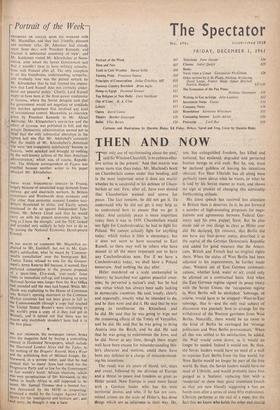- Portrait of the Week - PRES/VENT DE GAULLE. spent the
weekend with Mr. Macmillan, and they had 'friendly, pleasant and intimate talks, Dr. Adenauer had already spent three days with President Kennedy, and reached 'a substantial unanimity of view'; and Mr. Kekkonen visited Mr. Khrushchev at Novo- sibirsk. alter which the Soviet Government said that it wouldn t have to have military consulta- tions with Finland after all. The only exception tQ all this friendliness, understanding, sympathy, and brotherly love was the pained remark by Mr Khrushchev that he had 'formed the impres- sion that Lord Russell does not correctly under- stand our peaceful policy.' Clearly, Lord Russell Ought to have been at the three-power conference at Geneva, where the Soviet delegate said that his government would not negotiate or conclude any test-ban agreement that involved any kind ot international control. Meanwhile, an interview given by President Kennedy to Mr. Alexei. A■dzhubei; Mr. Khrushchev's son-in-law and the editor of kvesrja, was published in full, and the presCnt Democratic administration seemed not to .Mind that the only substantial alteration in the agreed, text was that Mr. Adzhubers 'comment that the' results' of Mr. KhrushcheV's _American trip were 'not completely Satisfactory' .becamp in lzvestia, 'were wrecked and brought to nothing by the well-known actions of the then American administration,' which was, of course, Republi- can. The Moscow correspondent of Figaro was expetled because another writer in his paper attacked Mr. Khrushchev.
THERE WERE WIDESPREAD STRIKES in France, largely because of unsatisfied wage demands from railway, gas and electricity workers. In Britain coalminers and Woolworth shop assistants and (for other than economic reasons) London taxi- driVers threatened to strike, 'arid Equity actors continued to do so against Independent Tele- vision. Mr. Selwyn Lloyd said that he would carry on with his present economic policy, 'as long as I have the strength,' and the TUC looked and sounded very unlikely to help him to do so by joining the National Economic Development Council.
IN THE HOUSE OF COMMONS Mr. Macmillan ex- plained to Mr. Gaitskell, but not to Mr. Gait- skell's satisfaction, what he meant by 'Common- wealth consultation' over the Immigrants Bill. Twelve Tories refused to vote for the Govern- ment's Army Reserve Bill because, it seemed, they Preferred conscription to the present proposal of a spare-time, D-a-week, 'ever-ready' force liable to immediate call-up, and keeping on some (stational Service men longer than the War Office had intended and the men had hoped. While Mr. .Heath was explaining to the House- of Commons Shy Britain's opening statement to the Common Market countries had not been given in full to the Commonwealth (though a copy had reached the United States) Reuter's were circulating to the world's press a copy of it they had got in 'Brussels, and it turned out that there was no reason why everybody shouldn't have had it in the first place.
MR. ROY THOMSON, the newspaper owner, broke into the magazine field by buying a controlling interest in Illustrated Newspapers, which include the Illustrated London News and the Taller, to say nothing of the Drapers' Record, Men's Wear and the publishing firm of Michael Joseph. Dr. Verwoerd, in a 'private letter; said that -hi . had noticed that 'so many' Jews had, voted for the Progressive Party and solew for the Government Iii last month's South'African elections, which Was very perspicacious of Dr. Verw'oerd-, as-the ballot in South Africa is still supposed to be secret. Mr. Samuel Thomas shot a hunted fox; Was denounced by the MFH as unsporting; promised a medal by the League Against Cruel Spurts for his 'courageous and humane act'; and gaid sorry, he thought it was a hare.






































 Previous page
Previous page